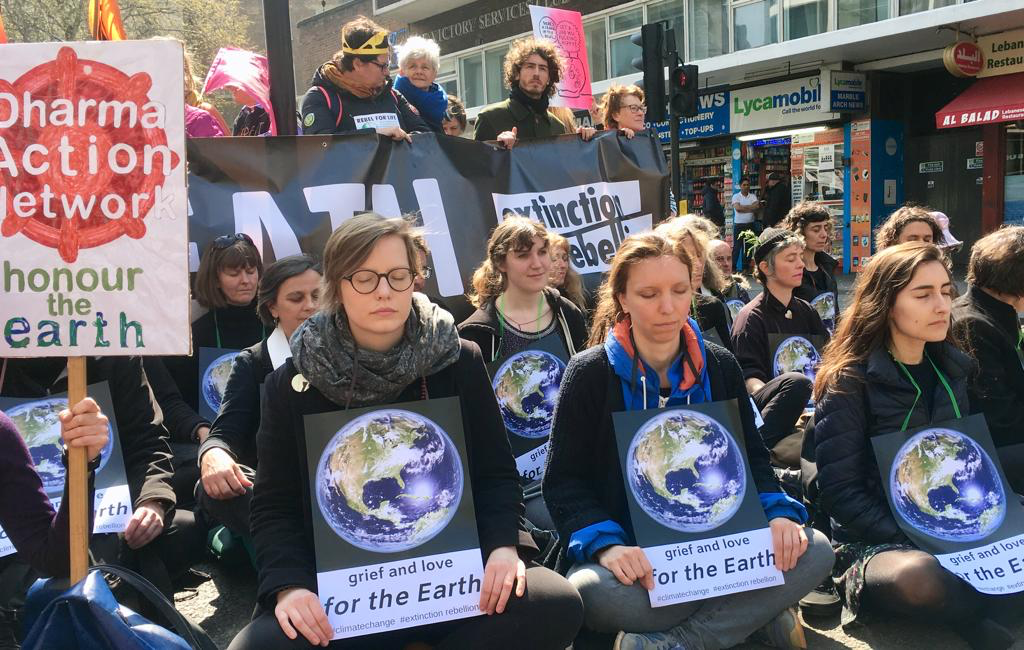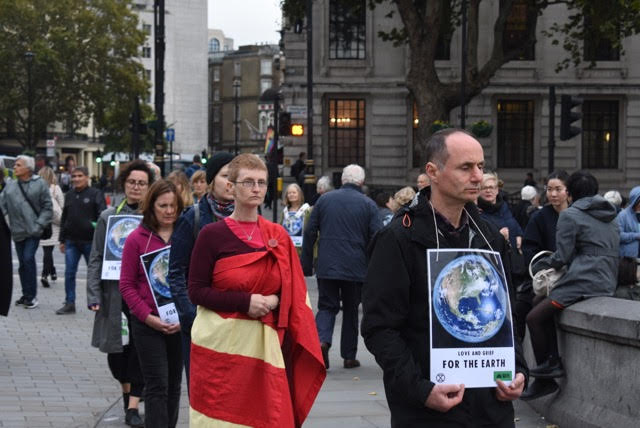By JOSEPH Mishan

It’s April 15th 2019; my anxiety rises as I approach the London venue where I’m expecting over 40 fellow Buddhists to gather. A few early arrivals are there already and they tell me that they can’t get in. My anxiety obediently notches up a point or two and I press the bell myself as if my status as organiser will surely work magic. It doesn’t. More people arrive, the door remains firmly shut and I remind myself that I am not in charge of the unfolding of life’s mysteries, including where the key to this particular door might be situated. Finally, one of the building staff arrive the door is opened and we file in to the cool interior to arrange the room and prepare for the gathering.
This is Dharma Action Network for Climate Engagement, soon to give birth to Extinction Rebellion Buddhists, at our second major Extinction Rebellion protest. We have Buddhists from across the lineages arriving to take action on this first day of two weeks of protests on the climate crisis. The planning is already done on social media. We will be starting with walking meditation to Marble Arch and then sitting in meditation in the road to block traffic. We have placards to hang around our necks which read ‘Grief and Love for the Earth’; over these words hovers a photograph of Earth from space. An incomparably beautiful blue-green planet, our home, now ravaged and depleted by years of remorseless exploitation.
But before we hit the streets we are meeting to connect with ourselves and each other, to remember why we are here. We meditate together, we speak and we hold silence to make room for the passion and the pain of our ravaged Earth, and of all beings caught up in this destruction. When we file out of the building we move from open hearts, which hold us in the knowledge that although we cannot ever know of the results of our actions, we can be sure of the necessity and the rightness of what we are doing, and the manner in which we are doing it.
Emerging from the underground station we form into a line and in noble silence we slow- walk the quarter of a mile down the length of Edgware Road; a quiet stream of contemplatives moving through the daily mayhem of a busy London street.
People stop and make way; I like to think they are moved by our message and our dignity.
We arrive at Marble Arch and are greeted by another group of Extinction Rebellion activists who have already blocked the road. After discussion we decide to ask if they will agree to us meditating in front of them. They are more than happy. We take our places on the road and as the singing bowl chimes we close our eyes for an hour meditation on the road. Presence, peace, rootedness. Police come and go, traffic honks support or anger, people shout abuse and encouragement. And we sit. We sit in honour of the Earth, inspired and held by two and half thousand years of our spiritual tradition.

The Buddha’s example
But this is an essay about whether Buddhists should remain apart from direct action on the social and environmental crisis that is facing us, and instead focus on personal growth and enlightenment. Are not these crises (and many others) merely the playing out of samsara; the arising and passing of forms fundamentally empty and transient? Should the Buddhist contribution not be to cultivate wisdom and clear seeing; to reveal the ultimately delusional nature of reality? Should Buddhists therefore not avoid politics and certainly direct action?
We might start to address this question by looking at the Buddha’s own life. What stance did he take in response to the issues of his day? There is in fact much evidence from the Buddha’s teaching and his life that he challenged the established order of his day quite directly.
The caste system was a dominating and powerful influence on the lives of the population of South Asia at the time of the Buddha. He took a radical stance on this. In the Assalayana Sutta a conversation between the Buddha and the Brahmin caste supremacist Assalayatta is reported in detail. Assalayatta is pretty smart: ‘a master of the Three Vedas with their vocabularies, liturgy, phonology, etymology, & histories; skilled in philology & grammar, fully versed in cosmology’ Nevertheless, the Buddha dismantles the Brahmins claims of his caste’s superiority with impeccable logic: asking for example, how sure the Brahmin is that all his caste is ‘pure’ Brahmin going back into history; and whether his case is subject to the same natural laws both physical and karmic as other castes and so on. The Brahmin’s claims start to look extremely thin and he is reported to have become rather dejected ‘When this was said, the Brahmin student Assalayana sat silent, abashed, his shoulders drooping, his head down, brooding, at a loss for words.’ The Buddha’s position is clear from this conversation: that he holds all four castes to be of equal merit. It is to be noted that the Sanghas which the Buddha set up did not allow any expression of the caste system.
In relation to women we also find the Buddha taking a decisive position. He established a monastic rule that ensured that the testimony of women should be sought if any dispute arose in the community – a radical act for his day. He also made it clear that women had the same potential for awakening as men, and he created a parallel nun’s order about five years after the start of the monk’s order. Within the nuns’ order women had the opportunity to opt out of what was a highly oppressive patriarchal system. His advice to his follower King Pesanadi the King of Kasala also expressed his view of women: he encouraged the king not to be downhearted on the birth of a daughter with these words: ‘Some women are better than men oh King. There are women who are wise and good, who are pure in thought and deed…’
The Buddha was also directly in contact with the kings of his day and gave advice to them – for example about the treatment of prisoners, education and the wisdom of going to war. He also addressed householders with the ’57 mental postures’; a guide for living which included advice on how to deal with lust and greed for example. The Pali literature of the Theravadins reveals the Buddha facing political intrigues and several wars. He counselled: Victory breeds hatred. The defeated live in pain. Happily the peaceful live, giving up victory and defeat.’
It is worth adding that many of the radical initiatives that the Buddha introduced were subsequently dropped or ignored after his death, Buddhism has become more patriarchal for example, and more focused on individual awakening rather than the good of the whole, perhaps influenced by the individualistic culture of the modern world. But the historical records do point to a man whose actions and words reflected an uncompromising stance on the importance of compassion and respect for all beings.
The Scriptures
Let us now turn to more faith-based objections to engaged Buddhist action. In my experience perhaps the most common objection to active engagement in the climate crisis is that based on the Heart Sutra’s wisdom teaching that ‘form is not different than emptiness’. If the real world is illusory why would we get engaged with it? Surely the best and most we can offer is the invitation to recognise this – to not get so hung up on the so-called real word? Should we not let go and relax into non-attachment to this illusory world, into the truth of formlessness. But this is to ignore that the Heart Sutra immediately adds: ‘emptiness is not different than form.’ In his book Eco Dharma David Loy, Buddhist activist and author writes: ‘the Buddha did not teach – nor does his life demonstrate – that non-attachment means unconcern about what is happening in the world.’ The exclusive emphasis on emptiness is the route to the ‘spiritual bypass’ which confers a bland un-concern for suffering of any sort as a misunderstanding. In her contribution to ‘Response to the Climate Emergency’ Joanna Macy sees this view of emptiness as a justification of non-action as a ‘spiritual trap that cut the nerve of compassionate action’. To give lived expression to the whole of the Heart Sutra’s teaching, ‘form is not different than emptiness and emptiness is not different than form’, is to find a path of deep compassion for all beings while holding our actions and the results of our actions within a knowledge of the vast emptiness of all things. In practice this confers on even the most decisive activism the qualities of clarity courage and calm.
There is of course a model for this compassionate and wise action in the service of others, which is the bodhisattva ideal of Mahayana Buddhism. This emphasises the combination of wisdom and of compassion and it replaces the focus on personal liberation with the aim of benefit to all beings. It is compassion in action. As the Dalai Lama has said: ‘It is not enough to be compassionate. You must act.’
In a recent interview David Loy is asked ‘what is Buddhism for?’ He replies: ‘how does our practice empower us to respond appropriately [to the climate crisis]? ‘and he goes on: ‘If Buddhism doesn’t help us to do that maybe Buddhism isn’t what the world needs today’. I believe, along with the growing number of deeply committed practitioners in our movement, that the world desperately needs the qualities and wisdom which Buddhism offers.
Thich Naht Hahn, the father of engaged Buddhism, emphasises the reality of interdependence. He encourages compassionate action based on the recognition that we ‘inter-are’; we are part of a vast web of intricate interdependence and interconnection. This means that work in the world is part of our work on ourselves (and vice versa): and so we do not wait until we are perfectly enlightened to enter the fray. Our activism is an expression and vehicle of our inner transformation; it is sacred work. This is why XR Buddhists must in my view continue to embrace expressions of activism which convey the power and potency of our faith, as we tread this path of engagement in our beautiful, precious and troubled world.
Joseph Mishan
Joseph Mishan is a mindfulness teacher in the Vipassana tradition, a psychotherapist and the coordinator of Dharma Action Network for Climate Engagement in London and a joint coordinator of XR Buddhists UK.
